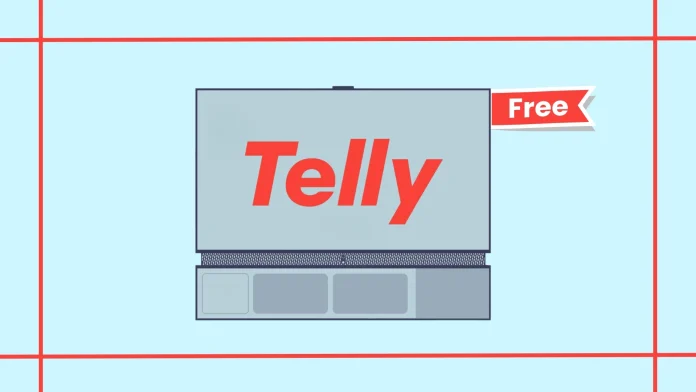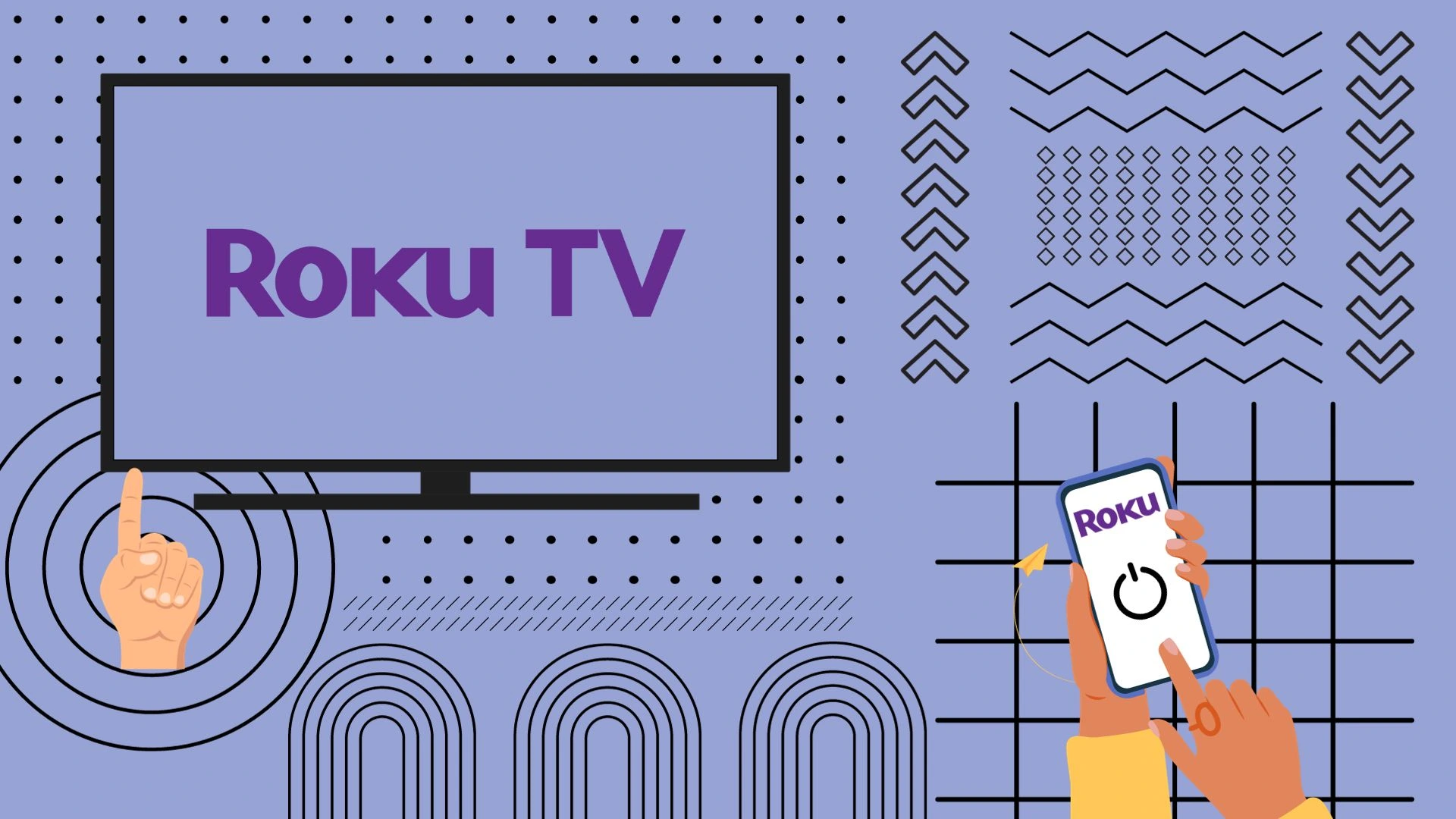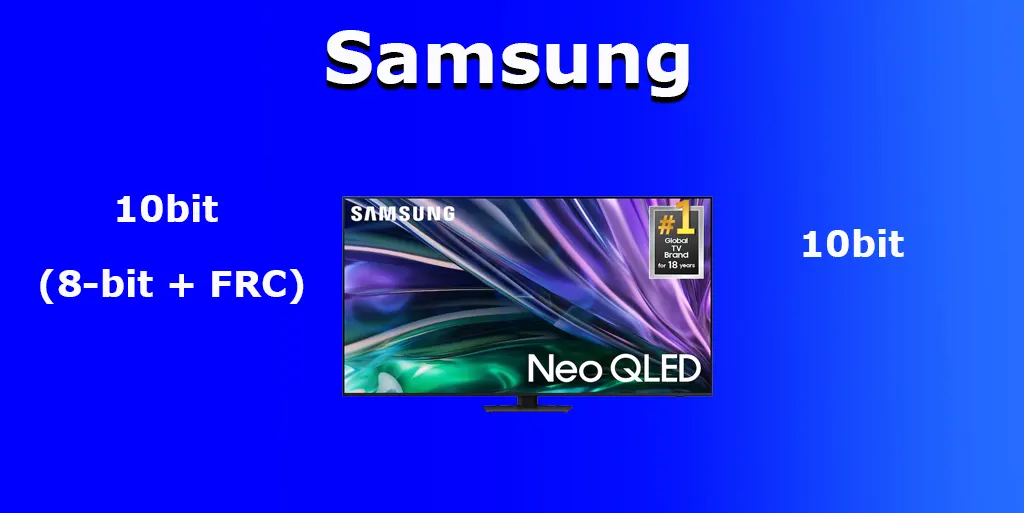What could be better than a TV that pays for itself? Or rather, you pay for it by seeing ads. Sounds like a good deal, especially if you don’t mind sharing your data and seeing ads.
That’s exactly what Telly has come up with, offering you a 55-inch 4K TV for free. In addition to the main screen, the TV has a second screen, about 9 inches in size, that shows ads.
According to Telly, more than 250,000 people have already signed up for the waiting list (June 2023 information), and the company wanted to deliver 500,000 TVs in total for 2023. Telly has fallen short.
The main attraction to Telly is the freebies. That is, you are literally being offered a TV that won’t cost you a dime. The second thing is that the TV looks stylish. Yeah, I like the way it looks.
It was founded by Ilya Pozin, a co-founder of Pluto TV, a free, ad-supported streaming service. Telly describes his startup as an industry-changing event. Indeed, it sounds like a business model: people get free devices, which will then pay for themselves through ads.
So, is Telly the future?
What’s going on?
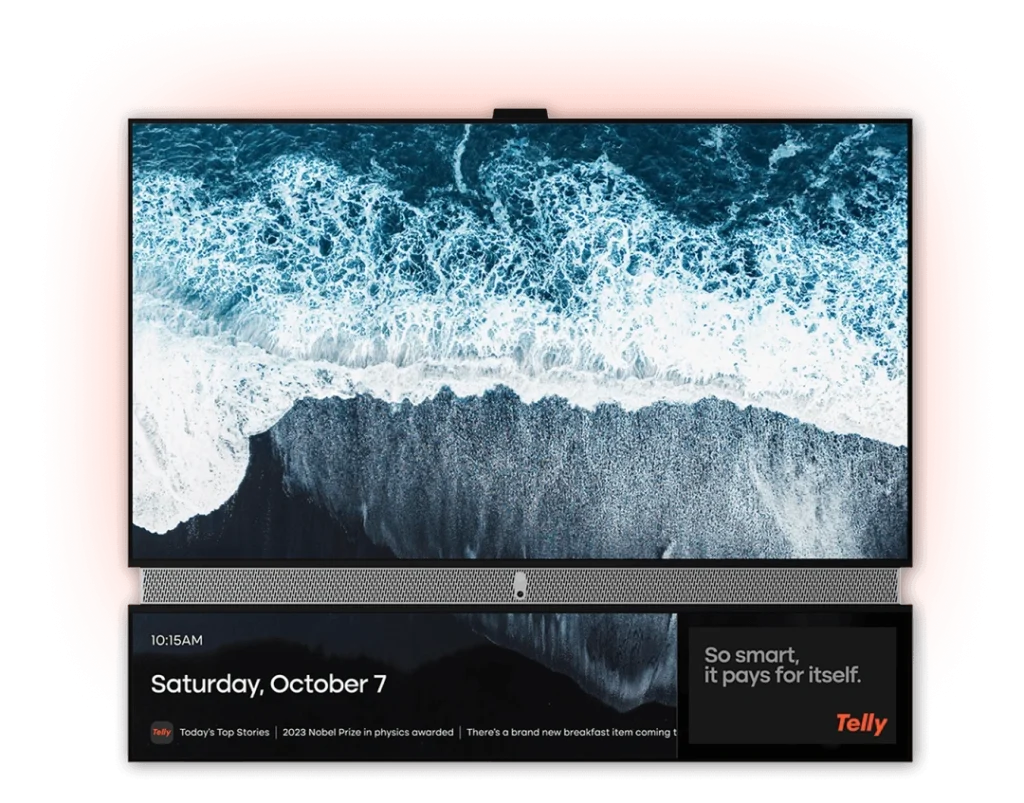
Telly describes itself as “The biggest thing to happen to TV since color.” But I’m always skeptical of such startups, although I don’t want to sound like a pessimist who looks for a catch in everything.
Let’s look into it. First, let’s take a look at how it all started. Telly planned to send out 500,000 free 55-inch 4K TVs in 2023. According to Dallas Lawrence, Telly’s chief strategy officer, who told CNET, such a TV is worth $1,000 if you buy it on the market.
What’s in exchange? The company will use a second monitor to show you targeted ads, collecting data about your habits, preferences, actions, and so on to show you things that interest you.
According to Lawrence, they are thinking about the best places to serve ads, including the main screen when you are not using it. True, he stipulated that it is still about convenience and maximizing the appeal of ads for users.
The issue of privacy raises many questions for journalists. The company does not hide that it will actively track your preferences to show suitable advertising. According to Lawrence, this will include your search queries, settings preferences, the apps you use, how and what you do, and your physical presence. There’s an important point here: the Telly TV has a built-in camera, but it’s not used to track your presence (and in fact, the company even offers a curtain so you can close it). Motion tracking is thanks to a passive motion sensor. So don’t worry about your privacy; the camera won’t be filming you (unless you use it for a video call).
In other words, the company will do everything to show you the most relevant ads, which will, therefore, be more expensive.
Telly seems happy with such an approach, even proud of it. Lawrence says that other companies are doing the same and doing it in a shady manner. “We change the model,” he said. This probably means that the company discloses how it will use you and your data and how it will earn from them. Maria Diaz from ZDNET says you pay for this free TV with your data. And she’s right.
And Telly is right. Other companies, including big names like Samsung, also show you ads and collect data. The one difference is that when I buy such a TV, I’m free to avoid such ads. On most TVs, you can disable them. On some models and brands, that’s easy to do; on others, you may need to block them on your router so they won’t appear. The only difference is that when I do so, I don’t fear that I will violate the terms. Other companies don’t care about how I handle ads. Even if the company doesn’t want me to turn them off and hide the feature, my TV is always mine. If I block IP addresses so the ads don’t load anymore, I’m not afraid of my credit card being charged.
In other words, everything I do with my TV is my own business. But that’s not so with Telly.
Telly explicitly warns its users that they will pay $ 1.000 if they violate the contract terms. I saw a $500 figure in earlier articles, but it has increased.
And this approach raises many questions about how it will all work in real life.
What is Telly TV?
The first thing you should know about Telly is that they offer you a budget TV. As far as I understand, this is a 55-inch 4K TV with LED display, 60Hz refresh rate, three HDMI 2.1 ports (this is very cool because most similar TVs have HDMI 2.0), HDR 10+ support, according to Reddit. However, the company doesn’t provide a tech specs sheet for their TV; you can find some information in their FAQ, but it’s split into different questions on their website.
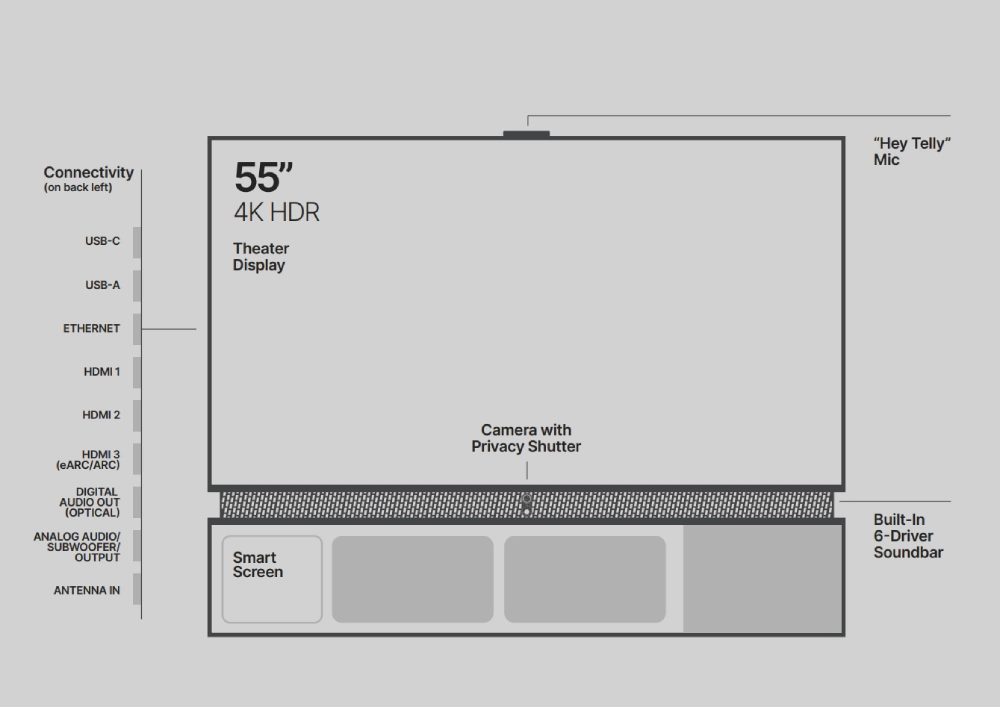
You can buy a similar TV at Best Buy for 250-500 dollars. For example, for less than 300 dollars, you can buy this Roku TV, this Insignia Fire TV, or this TCL Google TV.
This is surprising because the company claims that if their TV were on sale, it would cost $1,000. Okay, it still has a second screen and looks very nice. But I have my doubts that it would cost $1,000. But that’s just my opinion. In any case, you can buy similar TVs for less than $300.
Pozin and Telly often repeat one thought: “All TVs are the same.” This is indeed true, especially in the budget segment. But it is essential not to forget that the difference is quite apparent when we move into the higher segments. We get brighter displays, new technologies, and a better picture.
So, you can only approach the market with this assessment if you are talking about the budget segment, which Telly targets. The company is very proud that its TV offers additional features: an advanced processor, camera, good speakers, motion tracking sensors, Zoom video calling capability, etc.
As Chris Welch of The Verge put it, “It’s important not to let the wool be pulled over your eyes.” Now, smart features, motion tracking, and the ability to make video calls have become more commonplace.
But none of that matters because the important thing is that Telly will cost you $0. At least people are excited about getting STH for free.
How does Telly TV work?
The TV consists of two screens: a 55-inch main screen and a 9-inch second screen that displays advertisements and other information and controls menus. For example, if you listen to Spotify, you can turn off the main screen altogether and control the music on the small screen.
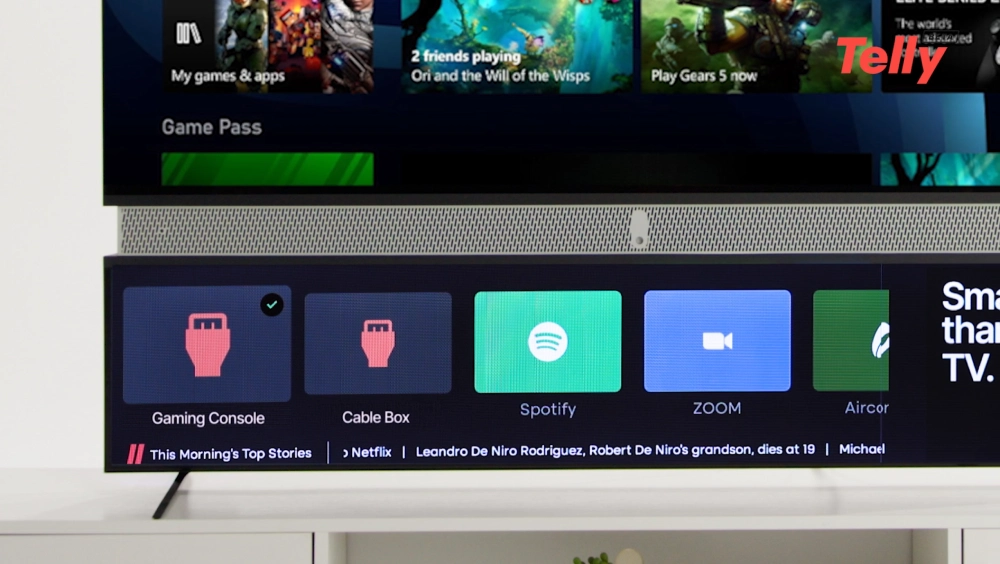
People who have already gotten Telly TV say, ” There aren’t as many ads as we expected,” and “the second display is something to get used to.”
The TV runs on Telly OS, a modification of Android. It comes with an Android TV dongle so you can access the services and apps available on Android TV. The company also says you can use other streaming devices like Roku, Apple TV, or Fire Stick.
But you can’t close the bottom screen or try to influence the TV to stop showing ads (including blocking ad IPs at the router level).
The bottom screen looks more like a website or subway screen sidebar. It shows information that depends on what you are currently watching. For example, watching an NFL game will show me scores, the time, weather, stock quotes, and something called Telly Bites. It’s like an information screen in the Kyiv subway with common-knowledge facts. For example: “Did you know that the Eiffel Tower gets taller in the summer?” and things like that. And ads.
Overall, the approach is quite reasonable and somewhat similar to the model. Websites use extra space to display ads and other tiny things that look cool but are usually not used by most people.
We looked at the Telly TV at the home of a man who was kind enough to show us this TV in action. The ads usually aren’t annoying and can take some getting used to. After all, we are used to ads on websites. Imagine having the same ads running in your living room. Sometimes it’s not annoying, and sometimes it is. For example, when the ad contains a QR code. It looks like I’m in a store. The QR codes are probably the thing that disappointed me the most.
The TV that pays for itself (with your data)
Telly has swung into action with a daunting task. In a densely competitive market, they want nothing less than to revolutionize and introduce a model where the device will be completely free, and the company’s advertising revenue will gradually offset its cost.
So what about advertising? Right away, I’m not a privacy adept, and what other journalists say is unimportant to me. For many in the media, the main issue has been that Telly invades your and your family’s privacy by collecting a lot of data from the questionnaire you must take to track your habits. All to show you relevant ads.
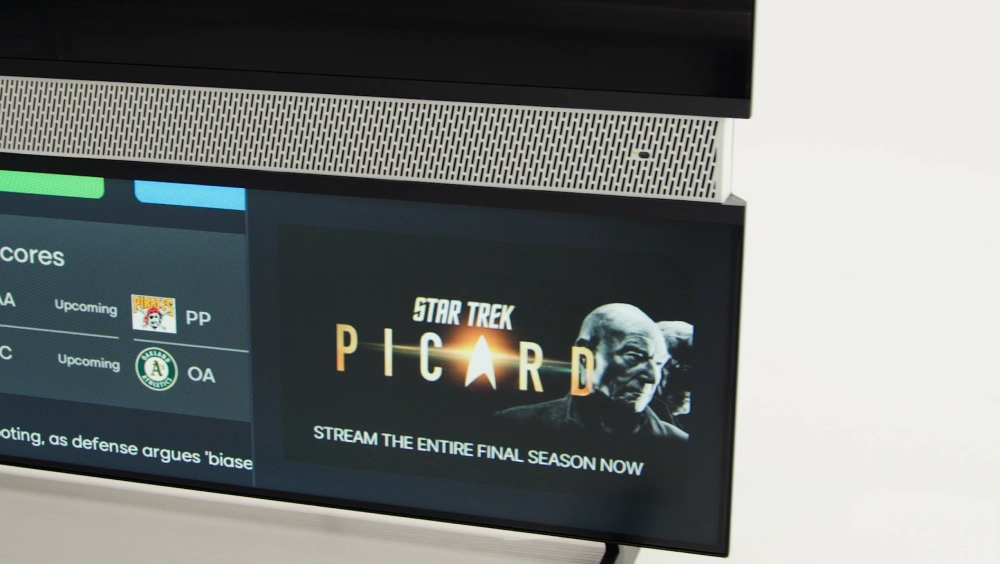
Brady Snyder of XDA Developers bluntly says, “No free tech product is worth surrendering your privacy.” That’s a controversial statement. If a person is willing, why not?
I don’t think privacy is the biggest problem with this kind of business model. The rest of our devices also collect data, and Telly at least honestly says it will collect it and show you ads but give you a free TV. In any case, this approach is more honest than that of some companies, where you realize that you will be shown ads after buying.
In the end, it’s each person’s choice. If people are willing to give up privacy for free TV, that’s their right. The company is simply offering an answer to their request.
The marketing
The other issue is that the key audience will be low-income or young people (the company’s data says that two-thirds of those wanting a TV are Generation Z and millennials). In this, I see a little trick of the company, which promotes its TV as if it is a revolutionary solution in terms of business model and as a device. As we have already realized, it is not. At its core, it is a common, albeit not bad, budget TV.
That’s what The Verge emphasized twice when talking about Telly. Their writer, Chris Welch, who has been to Telly’s offices, remarked twice to remind readers that it’s just a budget TV, and everything Telly says about it is in other TVs, including the way to make calls or track your fitness movements.
There’s a little trick to this, which I read as the company targets people who either don’t have a TV or have a very outdated TV that’s 5-10 years old. Maybe I’m wrong, but that’s how it seems to me. The idea that “all TVs are the same” and “Telly is the smartest TV” seems like the truth to these people. If I have a 2013 Samsung at home that even has a menu that screams “I’m obsolete,” it’s easy to believe that it’s not just a free TV but also a still very advanced TV that would cost $1,000; if I look for it on the market.
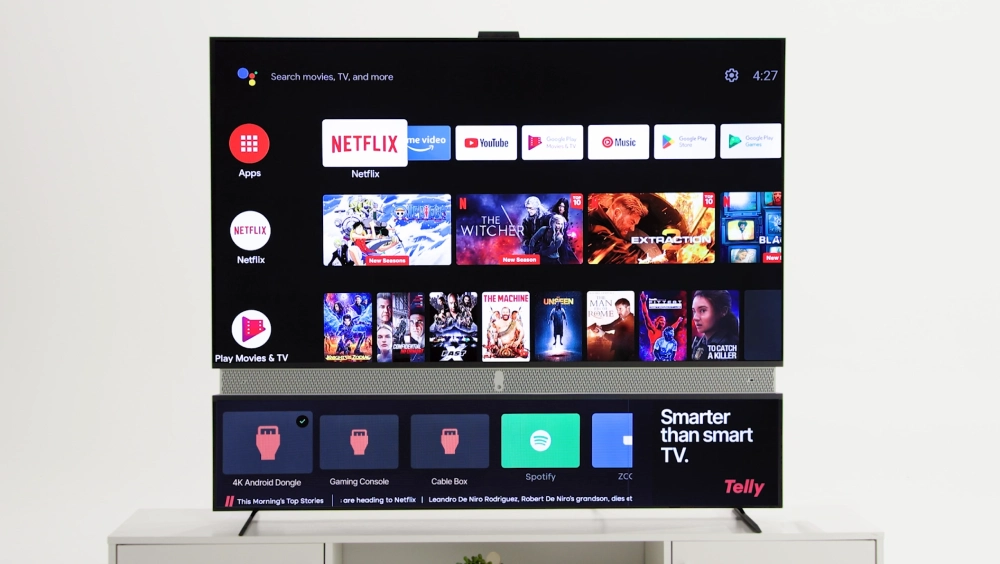
This is where the company lightly panders to its audience, who may not have considered buying a TV and thus have no interest in what TVs are and how they differ. You are told, “Get for free what others sell for money.” And you like it. And it’s all complemented by little things that make a person feel like it’s a very advanced product: good design, backlighting, good marketing, and phrases about “the most advanced TV” that the company’s management throws around in the media.
Is that a bad thing? No. It’s just part of marketing and what other companies do, absolutely all of them. It’s what marketing is at its core. So it’s not bad and doesn’t say anything wrong about the company. It’s just something to remember, especially if you’re unfamiliar with the TV market.
The questions with no answers
But one thing has stuck with me from the moment I learned about Telly TV: How will this all work?
How will the company make it so I don’t get a free TV, put it in my garage, and listen to music once a month? Or do I just take the TV for nothing and leave it in the closet?
And here comes the point that I have the most questions about. So, let’s say I want a free TV. If I’m ready to share my data and watch ads on the bottom screen, it’s not a problem for me as long as everything else works.
But suppose I wanted to get Telly TV. I have to sign up, download the app, provide my home address and credit card details, and take a survey to create an advertising profile. Okay, that seems fine.
And then I get a shipment notification. Yay! I’m getting a free TV. After shipping, I have five days to activate my Telly, according to their Terms of Service.
Their Terms of Use states that I must “Use the Device as the primary television in your household and not in an office, business or any commercial setting.” This is the first thing that raises questions. How does the company determine whether I use Telly as my primary television?
The second thing that raises questions for me is the $1,000 penalty; unless you violate the terms of use by, for example, trying to avoid advertising or disconnecting the device from the Internet, then “you must return any Devices in your possession to Telly. If you fail to return Devices to Telly, you authorize Telly to charge your credit card on file \ $1,000”, according to their Terms of Service.
What exactly is it that makes me suspicious? First, there is no straightforward algorithm on how exactly I can return my device. I don’t see any transparent algorithm or form or possibility to specify in the application that I want to return the device. And I can’t understand how exactly this return will take place. And if I don’t return the device, my credit card will be charged $1,000.
All the Terms of Service say about Telly TV returns is “You’re free to do that at any time by contacting us at support@freetelly.com”. What is the time frame for returning my device? How will the return be handled? I don’t have an answer to all these questions.
I mean, I understand that they will send delivery people to my house to pick up the Telly if I want to cancel it. But when should they arrive? Who chooses the time and day they arrive?
All of this creates additional thin spots that can lead to potential problems. After all, if I opt out of Telly, I can’t just disconnect it from the Internet; that would violate the terms of use. It turns out that I have to wait for the device to be taken away from me.
That said, I don’t understand precisely how this is supposed to happen. I mean, can I pick a time and a day? Or do I just get a message that the courier can’t get in if I’m not at home, for example?
And yes, Telly should always be connected to the internet. The only exception would be a power outage. But what if I want, for example, to go on vacation and disconnect the TV from electricity? Or, what should I do if I want to change my place of residence and move my TV to another house? Or how should I prove I had a power outage in my house?
The issue with the $1,000 compensation is also essential. I’m not ruling out the possibility that couriers from Telly come to pick up the product at an inconvenient time when the person is not at home, and then the person could be fined $1,000 for violating the Terms of Service.
And these are issues that the company does not disclose. So, it remains a gray area for now.
Telly will never be yours
Technically, Telly gives you the device in perpetuity. And it will never be yours, not in a year or three. It must always be connected to the Internet as your primary TV.
Even after three years, if you faithfully use the TV, watch commercials, and share your data with Telly Inc., you can still, in theory, be fined $1,000 if you don’t comply (disconnect Telly from the Internet) and fail to return the device to the company.
This is also a gray area because let’s imagine the situation.
You’ve been using Telly for two years. And now your child has damaged the TV. At that time, the company has made its advertising money, and you’ve already transferred a lot of data. In that case, you can still be fined. The Terms of Service don’t cover what happens if you damage the device. The Reddit community recommends contacting Telly by email because each case is decided on a case-by-case basis.
But for me, this issue is essential. Because the compensation amount can’t stay the same throughout, logic dictates that it should decrease as I use Telly. It’s one thing if I just got a Telly and disconnected it from the Internet a week later and didn’t return the device to the company. It’s another if the same thing happens two years later.
In that case, the compensation amount should be less (or none at all); that would be a fair approach. But we don’t see it, and your agreement with Telly, Inc. is open-ended.
Valery Artamonov, one of our writers, gave us more food for thought. He said, “Why doesn’t Telly think about their TVs getting outdated? If a brand-new Telly TV costs $1,000 in 2024, by 2028, it will be worth a lot less—maybe 60-70% less—because TVs keep getting better, and $1,000 will seem too much. So, it’s weird that Telly doesn’t lower that $1,000 price over time, given how clear this is.”
It is clear that these TVs will become obsolete after 2-3 years, and either the company will replace them with newer models or people will discard them. And the main issue is that the company is not giving you transparent information about how this will happen.
- I don’t know what “return the product” means. How do I express that I want to return the product? Email. But what if I don’t get a response? The company doesn’t offer me a physical address to send a paper letter confirming that I want to return the product.
- I don’t know what “fail to return Devices to Telly” means. If I want to return a device but the delivery service does not arrive on time (or on time when I’m at home), does that mean I failed to return the product to Telly and can be charged $1,000?
- If I disconnected Telly from the Internet for some reason, such as replacing it with another TV, how will the company contact me to arrange a return?
- Who is even responsible for returning the product? The Reddit community says that a courier sent by Telly will come to me, but this is not disclosed in the Terms of Service.
And most importantly, what will happen to these TVs in 2 or 3 years? And what will happen if the company has financial problems? Will it not turn out that the responsibility for returning the TV will fall on me as a customer, and if I can’t return it, Telly Inc. or its successor will just write off my money?
So no, Telly’s problems are not privacy or your data. It seems to me that the company is quite honest in this matter. They provide you with a TV, and they do it for free. The other question is what to do if I don’t want that TV anymore and want to return it.
And that, to me, is the central question that other media should be asking as well. to understand how safe this model is for potential users and whether in the future there will be a situation where many consumers of free TV will pay $1,000, even after a few years.
If you work at Telly and want to clarify these questions, you can reach me at mashirenko@tab-tv.com.

